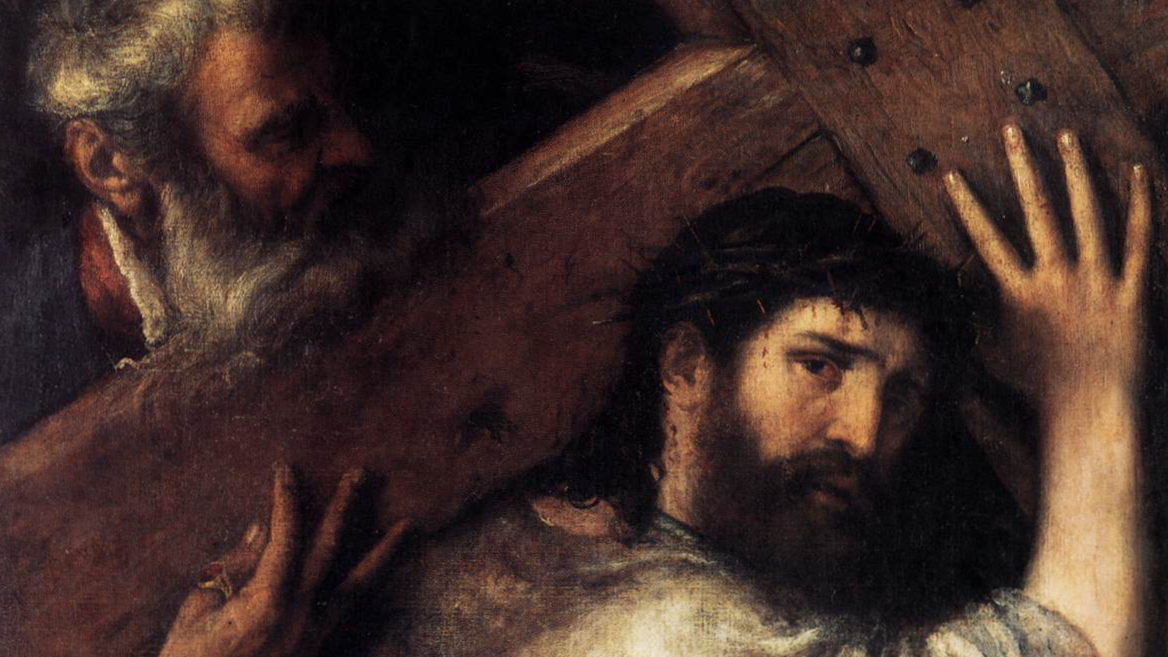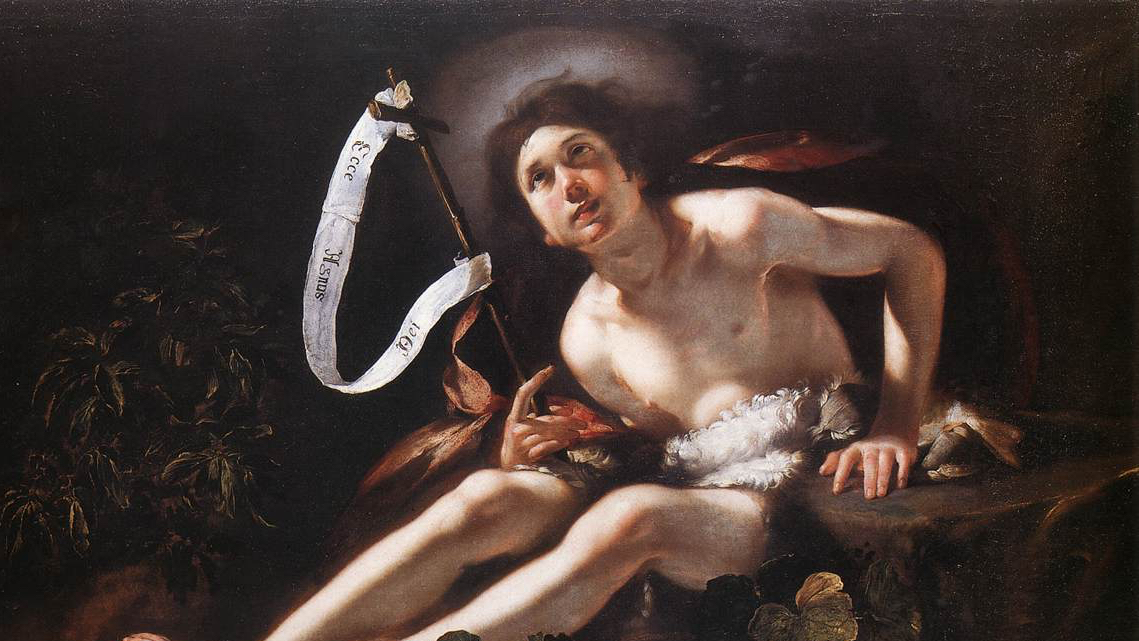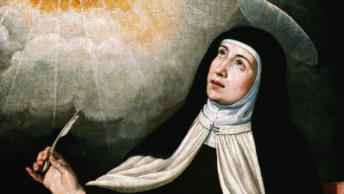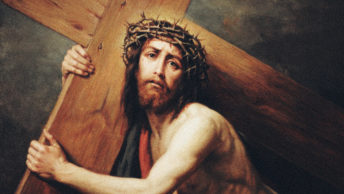Ask any good Franciscan and they will tell you how proud they are to practice the virtue of humility. Humility is at the core of Franciscan spirituality. St. Francis expressed this virtue not only by living a life of simplicity and poverty, but also in his profound devotion to the incarnate God. God, the almighty creator of all that is, humbled himself to become a creature, taking on the flesh and blood of man; man, a creature made out of dirt.
St. Bonaventure, the great Franciscan mystic and theologian, delved into what it means to live a life based on humility. Typical of Bonaventure, he began his contemplation with God, who is the source of all that is. If we are to really understand humility, and if humility is a good to be pursued, then it must have its origin in and with God. He laid out his thoughts in what he called the “Three Fold Movement” of humility, or what I like to think of as a play in three acts.
Act One: God moves in humility towards us
Act Two: We respond in humility to God
Act Three: As a result of acts one and two, we turn in humility towards others
Act One
“ Then God said, “Let us make man in our image, after our likeness;”” (Gen 1:26 RSV) “then the LORD God formed man of dust from the ground, and breathed into his nostrils the breath of life; and man became a living being.” (Gen 2:7 RSV) In the beginning of sacred scripture we see God, who is complete within himself, who needs nothing to increase his Godness, create a rational living being in His image. Out of the dust of the Earth, God breathes life into matter. Ruha is the Hebrew word that is used to describe this breath of life. Ruha has two meanings; breath and spirit. Just as breathing is essential for this creature to live physically the created being needs the spirit of God to live the life for which God created, that is, to share in the life of the Trinity. This was not lost on the psalmist who contemplated “You take back their spirit (Ruha), they die, returning to the dust from which they come. You send forth your spirit, they are created; and You renew the face of the Earth.”( Ps 104, Grail translation ).
Psalm 8 also expresses the wonderment of God’s reaching out in humility to make a creature with whom He shares His glory. “When I see the heavens, the work of your hands, the moon and the stars which you arranged, what is man that you should keep him in mind, mortal man that you care for him? Yet you have made him little less than a god; with glory and honor you crowned him, gave him power over the works of your hand, put all things under his feet.”(Grail translation)
In the prologue of John’s Gospel, we see an awesome display of God’s movement in humility toward us. The Word was with God from all eternity, not only was the Word with God, the Word “is” God. All of creation came to be through God’s Word and nothing was created without the Word. All of creation came to be “for” the Word. And if that is not in itself sufficiently awesome, the Word that created so loved his creation that he desired to become a part of that creation. “And the Word became flesh and dwelt among us” (Jhn 1:14). To emphasize this “enfleshment” of God, John writes in his first letter “That which was from the beginning, which we have heard, which we have seen with our eyes, which we have looked upon and touched with our hands, (1Jo 1:1 RSV) John heard, saw and touched the Word made flesh.
To finish this thought of the creator becoming one with his creatures, reflect on the great hymn from Philippians “who, though he was in the form of God, did not count equality with God a thing to be grasped, but emptied himself, taking the form of a servant, being born in the likeness of men. And being found in human form he humbled himself and became obedient unto death, even death on a cross.”(Phil 2:6-8 RSV)
To summarize up to this point, we have God moving in humility towards us firstly by creating us and giving us a share in his life, and secondly, by lowering himself from the infinite gap between the creator and the creature becoming one in nature with us. Humility began with God creating and reached its pinnacle when God became a creature himself; perfectly divine, perfectly human.
The story of Christ is one of humility. From the conception in the womb of Mary to His death on the cross, all that Christ did and taught was immersed in humility. The almighty God, God most high, Lord of the universe, the God who created the heavens and the Earth humbled himself and was born in a cave. He was a refugee, fleeing for his life as an exile in Egypt. He lived a quiet and simple life in a backwater town, working with his hands at hard labor. We are told in Luke chapter 2 that the creator of the universe was humbly obedient to his earthly parents. When he began his public ministry, he submitted himself to the baptism of John, when in truth, Jesus should have been the one to baptize John. He owned the clothes on his back which in the end were divided among his executioners. The Son of Man had nowhere to lay his head. “He came to his own home, and his own people received him not.”(Jhn 1:10) He was falsely accused; witnesses committed perjury against him. He was spat upon, beaten, scourged, mocked and crucified, suffering the death reserved for those whose lives were considered less than human. God moved throughout his earthly life in humility towards his beloved creatures, submitting to all of it for the sake of redeeming the creatures with whom he longed to share a portion of his divinity. No greater love is there than to lay down one’s life for a friend, and God, become flesh, laid down the entirety of his life from conception through death for not only his friends, but for all, even those who he forgave for not knowing what they do. The all-powerful God, who with one word could have erased all of creation and started over, humbled Himself for the sake of his creatures.
Each Easter vigil, the Church remembers this movement in humility of God towards his creature in the Exultet. This great Easter hymn recalls for us Salvation history and God’s coming to redeem us. In the hymn the deacon chants “O truly necessary sin of Adam, destroyed completely by the Death of Christ! O happy fault that earned so great, so glorious a Redeemer!” The Franciscan John Duns Soctus may take issue with these lines of prose. Yes, Christ came as our redeemer, but was the sin of Adam really necessary as is chanted in the hymn? Was the fall of Adam really a “happy fault that earned” a redeemer? Scotus suggested that it was God’s plan from the beginning to become one with his creatures. Christ would have become man even if Adam did not sin. God longed to be one with his creation when he created. The Word was going to become flesh as part of God’s plan of creation. Because of Adam’s sin, he came as a redeemer, but Adam’s sin was not the cause of the incarnation, as if Adam sinned, and then God decided that he longed to become one in nature with his creature.
Further demonstrating the humility of God towards us, it is suggested that Lucifer rebelled against God because of his plan to become man. A perfect contrast to humility was Satan’s response in pride “ I will not serve!” The angels who rebelled could serve the creator God, but could not bring themselves to serve a God become creature, an inferior to the angels creature made from the dust of the Earth.
Christ ascended into heaven. He is seated at the right hand of the Father where “God highly exalted Him, and bestowed on Him the name which is above every name, that at the name of Jesus every knee should bow, of those who are in heaven, and on earth, and under the earth, and that every tongue should confess that Jesus Christ is Lord, to the glory of God the Father.”(Phil 2:9-11 RSV) Is this the end of God’s movement in humility towards us? Now that Christ has risen and ascended to heaven in all of his glory, do we now look at this movement in humility as being complete?
St. Francis tells us that daily, the Father moves towards his creatures, in humility through Christ by the power of the Holy Spirit.
“Let the whole of mankind tremble, the whole world shake and the heavens exult when Christ, the Son of the living God, is present on the altar in the hands of a priest. O admirable heights and sublime lowliness! O sublime humility! O humble sublimity! That the Lord of the universe, God and the Son of God, so humbles Himself that for our salvation He hides Himself under the little form of bread! Look, brothers, at the humility of God.” (St. Francis, A Letter to the Entire Order)








